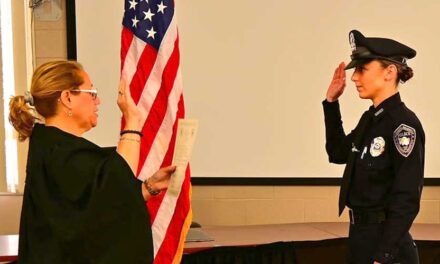Published in the July 30, 2015 edition
By DAN TOMASELLO
NORTH READING — The Partnership for Assessment of Readiness for College and Careers (PARCC) test taken by local students last year received mixed reviews from parents and teachers, said Assistant Superintendent Dr. Patrick Daly on Monday.
The School Committee approved the new exam in a 4-1 vote last June over the objections of a large group of parents. The Board of Elementary and Secondary Education (BESE) announced in 2014 school districts had a choice to go with either MCAS or PARCC. The BESE is scheduled to vote in November on whether Massachusetts should replace MCAS with PARCC.
The school department administered a paper version of PARCC in four schools in grades 3-8. The only school that took the electronic version of PARCC was the Batchelder School, which administered the exam via desktop computers and Chromebooks. The Hood, Little, middle and high schools administered paper exams.
At the high school, freshmen took the grade 9 Algebra 1 exam. Sophomores took the MCAS English and math exams and freshmen took the MCAS biology exam to meet the state’s graduation requirement.
Daly said the results from the PARCC exam will be released in late fall. While the school district will receive accountability scores, Daly said the school system will be “held harmless” for “test driving” PARCC. However, students’ PARCC scores will still be used to evaluate teacher performance as required by the state mandated teacher evaluation system.
Survey results
Daly presented survey results that were taken by local teachers and parents via SurveyMonkey. He said 139 parents, 89 classroom teachers, 27 special education teachers and three administrators took the survey.
“If we hadn’t previewed this assessment and hadn’t done this test drive, we wouldn’t be able to have this data from teachers, students and parents,” said Daly. “If we had a chance to preview MCAS in the 1990s, we would have liked to do that.”
Superintendent of Schools Jon Bernard agreed with Daly’s sentiment. He noted that both he and Daly have engaged in discussions with Department of Elementary and Secondary Education (DESE) Commissioner Mitchell Chester and Secretary of Education Jim Peyser about North Reading’s experiences taking PARCC.
“We are not advocating or championing the PARCC cause,” said Bernard. “We wanted to do the responsible thing and be part of framing the discussion and ultimately contributing to the decision that is made. If we had not been a part of this pilot, our contributions may not be well received by the people’s ears we feel we have.”
The survey included questions about the Common Core State Standards as well as PARCC. While Daly said the observations from teachers revealed PARCC and the Common Core are “rigorous,” he said the majority of teachers reported, “PARCC is not necessarily superior to MCAS.”
Teachers also reported computer-based testing was successful but Daly said it required an “all hands on deck” approach to administer the electronic version of PARCC at the Batchelder School.
Daly said 94 percent of local teachers responded that the Common Core Standards are more rigorous or just as rigorous as the previous standards. Additionally, 39.55 percent of teachers reported the Common Core is developmentally appropriate while 28.36 percent of teachers believed the standards are not developmentally appropriate.
The assistant superintendent said 57 percent of teachers reported the PARCC English language arts exam was “inferior” to the MCAS English exam. He said 52 percent of local teachers believe the PARCC math test was inferior to the MCAS math exam.
According to Daly, 21.35 percent of teachers reported PARCC is a higher quality assessment than MCAS, 43.82 percent of teachers reported PARCC is a lower quality assessment and 34.83 percent of teachers responded that PARCC is “about the same” as MCAS.
Daly said 78 percent of students experienced “test anxiety” due to the PARCC exam.
According to Daly, 97.12 percent of local parents responded that their children took the exam, while 2.88 percent of parent’s children did not take PARCC. He said many parents felt there is “too much emphasis on standardized testing.”
“This is not just a North Reading criticism,” said Daly. “This is also a state and national criticism.”
Daly said 46 percent of parents reported that their child was prepared to take the PARCC exam, while 35.77 percent said no. Another survey question revealed 42.96 percent of parents felt that the time their child’s teacher spent preparing students for PARCC was inappropriate, while 37.78 percent felt the amount of time teachers spent preparing children for the exam was appropriate.
Additionally, Daly said 50.36 percent of parents reported the school department provided sufficient information about PARCC, while 42.34 percent of parents felt the school department did not provide sufficient information about PARCC.
School Committee member Jerry Venezia asked Daly if other school districts have given similar feedback about the PARCC exam. Daly said the feedback he has heard from other districts is “very similar” to North Reading.
In addition to local teachers and parents, Daly said the Massachusetts Teachers Association (MTA) has come out against PARCC and standardized testing. He said the MTA believes standardized testing reduces time to teach, narrows the curriculum, misuses funds for education, is stressful and reduces creativity.
Venezia and School Committee Vice Chairman Mel Webster both took issue with the MTA’s criticism. Webster said he has engaged in discussions with school committee members from around the state, who informed him their district is eliminating programs because of standardized testing. He said that is not taking place in North Reading.
“I don’t know where these people are coming from because we are not seeing that,” said Webster. “I don’t see our curriculum being narrowed.”
Local parent and staunch PARCC opponent Laina Simone, 7 Deerfield Place, said she supports the MTA’s opposition to PARCC. She said there is a “movement” underway to scrap PARCC and noted the PARCC consortium started with 26 states and now contains 12.
Simone also disagreed with Webster’s sentiment about the school department narrowing its curriculum. She claimed her seventh grader “spent a minimum of two months on PARCC prep and it countered toward her grade.” She also said the school system has focused primarily on English language and math, and has let other subject areas “fall by the wayside.”
The parent also brought her third grade daughter to the meeting, who said she spent once a week focusing on science and once a month focusing on social studies this past school year.
Daly said one of the main purposes of test prep is having students practice the skills they are learning in class, which he said is “not taking away from the curriculum.” He noted reading and writing is interconnected to the school department’s science and social studies curriculum.
“We are teaching our curriculum and the standards,” said Daly. “We are not narrowing the curriculum.”
In response to a question from Simone about technology, Daly said the school system would be able to administer an electronic-based version of PARCC if the state scraps MCAS. However, he said he would urge state officials to make a paper-based exam available to schools because he noted there are school districts that still use “dial-up Internet.”
Next steps
Regardless of whether or not the state decides to replace MCAS with PARCC, Daly said sophomores will continue taking the MCAS for at least one more year. Freshmen will take the MCAS biology exam, and fifth and eighth graders will continue taking the MCAS science exams.
If the state decides to switch to PARCC, Daly said the exam will be administered only once after the exam was administered twice last year. He also said the PARCC Governing Board voted in May to reduce the exam’s testing time by 90 minutes (60 minutes in math and 30 minutes in ELA).
In response to a question from School Committee Chairwoman Janene Imbriano, Bernard said the exam’s testing time was reduced due to pushback from school officials across the state.
Daly noted several questions still remain about PARCC if the exam is adopted, including whether or not school systems will be given the option to administer the test electronically or via paper. He also said he believes the state will need to establish a timeline if a decision is made to switch from MCAS to PARCC.
Bernard and Daly will also be writing a letter to state education officials to outline the school department’s experience with the PARCC exam.




